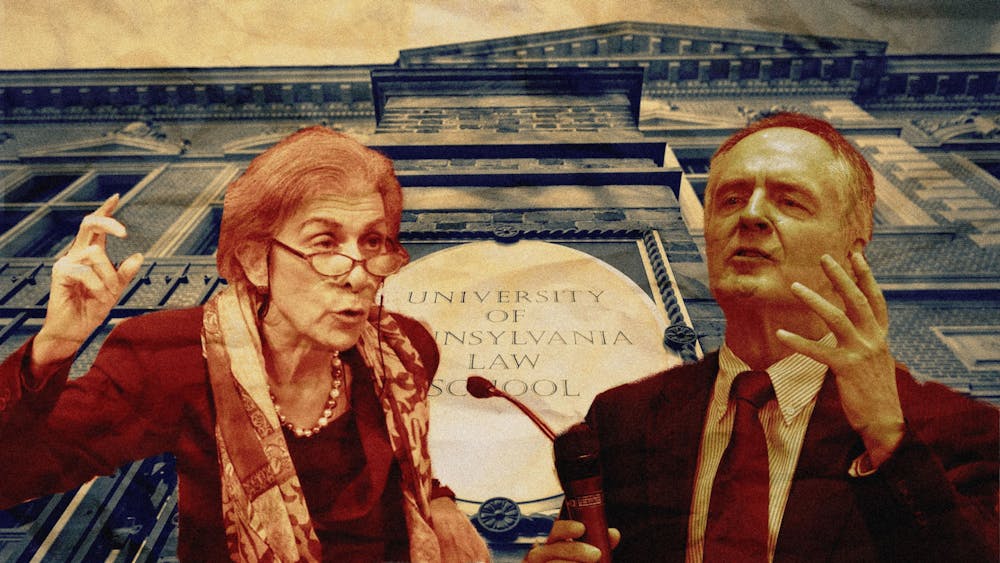
Penn Carey Law School professor Amy Wax invited Jared Taylor, editor of American Renaissance, to her “Conservative and Political Legal Thought" class this semester.
Credit: Insia HaqueA white nationalist will visit campus this semester to deliver a guest lecture in a course taught by University of Pennsylvania Carey Law School professor Amy Wax.
Wax invited Jared Taylor — editor of American Renaissance, a publication that the Southern Poverty Law Center calls a promoter of eugenics and pseudoscience — to speak at her Nov. 28 class of LAW 9560: “Conservative and Political Legal Thought,” according to a copy of the course syllabus obtained by The Daily Pennsylvanian. This will be at least Taylor’s second visit to campus after he spoke at the same class in fall 2021.
Taylor's scheduled return to Wax’s seminar comes as Penn is yet to announce whether it will sanction Wax — four months after a faculty panel held disciplinary hearings and over 19 months since an investigation began. The University has alleged that Wax’s controversial conduct and claims have violated Penn's behavioral standards, naming Wax's invite of Taylor to her class as one such example.
Representatives from Penn Carey Law, Wax, and Taylor did not respond to requests for comment by publication. Previously, Wax declined to comment on the University's disciplinary proceedings when approached outside her office earlier this year on April 17.
Penn Carey Law third year and Council of Student Representatives President Vinila Varghese said she was not surprised that Taylor was visiting campus — but she was surprised that Wax was able to invite him again.
"Probably because [Penn's] investigation is still ongoing, she can do what she wants because she is a professor, and they have that freedom and discretion," Varghese said. "I just think that there are some people you don't invite into a school, and someone who is well known as a white nationalist is definitely someone I wouldn't invite into a school."
Taylor has previously stirred controversy at other university campuses, including a visit to Arizona State University last fall hosted by its College Republican United club. He has also visited Vanderbilt University, Northwestern University, and George Mason University.
“I have spent 25 years patiently establishing the factual and moral bases for discrimination,” Taylor wrote in a blog post on his website American Renaissance.
During those 25 years, Taylor has alleged that there is a genetic inferiority between white people and people of color. In other recent blog posts, Taylor complimented a statue that described former Confederate President Jefferson Davis as the “knightliest of the knightly race,” accused Hispanic civil rights leader César Chávez of exploiting his Latino heritage for convenience, and called the Confederate cemetery the “nicest place” in Selma, Ala., a city that he said Black people should be "embarrassed" by.
In June 2022, former Penn Carey Law Dean Ted Ruger wrote that Wax's invitation to Taylor "crosses the line of what is acceptable in a University environment where principles of non-discrimination apply,” in a document where he asked the University to impose a “major sanction” on Wax.
"Although faculty members have broad discretion in their teaching and academic pursuits, Taylor's explicit racism, hate-speech, and white supremacy contravenes the University's express policies and mission, and his white supremacist ideology has been associated closely with those perpetrating violence towards minorities in this country and others," Ruger wrote in the report to Penn's faculty senate chair.
Southern Poverty Law Center writes that his site has published speakers promoting eugenics.
In a July 30 appearance on the podcast “The White Papers,” Taylor claimed that there are innate disparities in trust between European and African or Latin American societies, contributing to white societies faring better. He called the idea of “white privilege” and “systemic racism” a “preposterous conspiracy theory.”
Professors have the academic freedom to bring in speakers that they believe are relevant to the course — even though their beliefs may be controversial or offensive, according to Zachary Greenberg, a senior program officer at the Foundation for Individual Rights and Expression, a free speech organization.
"The right to bring in speakers to speak to classes, that is the center of academic freedom, and it provides no exceptions to speech that may be provoking or offensive," he said.
Moreover, members of the University community are protected from "official reprisal" for hosting "controversial speakers and events," according to Penn's interpretative guidelines for its open expression policy.
"The unpopularity of a speech’s content or viewpoint is not a reason to suppress speech," the guidelines read. "Objectors may not have a 'heckler’s veto' over speech with which they disagree."
Wax alleged in a filing earlier this year that Penn Carey Law consented to her request for permission for Taylor to speak in her seminar in 2021 and that the school reimbursed the lunch at White Dog Café where Taylor spoke with students.
"I do not know what he could bring that would be productive, informative, or for the greater common good," Varghese said. "At the end of the day, what he may bring is spewing out hateful rhetoric or giving data and statistics that are just not supported."
Correction: A previous version of this article erroneously wrote that Jared Taylor had spoken at George Mason Law School when he in fact had spoken at George Mason University. The DP regrets this error.
The Daily Pennsylvanian is an independent, student-run newspaper. Please consider making a donation to support the coverage that shapes the University. Your generosity ensures a future of strong journalism at Penn.
Donate




